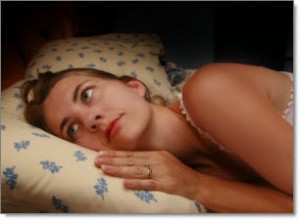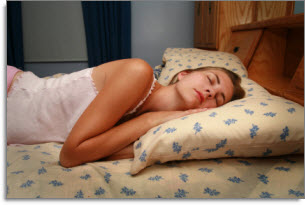Stop losing out to insomnia. Here are 10 highly effective tips for falling asleep — and staying asleep — with greater ease.
- For Rip Van Winkle was old and gray,
And twenty summers had passed away—
Yes, twenty winters of snow and frost
Had he in his mountain slumber lost…
— from “Rip Van Winkle” by Washington Irving
 Unlike ol’ Rip, if you have suffered sleepless nights, then you’re familiar with a particular kind of torment whereupon minutes seem like hours, hours become days, and problems you ordinarily manage with ease seem nightmarish when processed at 4 a.m. It is called insomnia, and it not only causes disgruntlement at night, but can also significantly impair your functioning by day.
Unlike ol’ Rip, if you have suffered sleepless nights, then you’re familiar with a particular kind of torment whereupon minutes seem like hours, hours become days, and problems you ordinarily manage with ease seem nightmarish when processed at 4 a.m. It is called insomnia, and it not only causes disgruntlement at night, but can also significantly impair your functioning by day.
Insomnia is the most common of sleep disorders. It generally manifests itself in a threefold way: difficulty in falling asleep, difficulty in staying asleep, and early morning awakening. Insomnia may include a combination of these characteristics, and in extreme cases, it may mean complete wakefulness.
The majority of insomnia cases are plagued by emotional content. Anxiety and unresolved anger are inextricably linked to unsatisfactory sleep. Depression is often the culprit for those experiencing early morning awakenings.
Here are 10 effective ways to help yourself fall asleep more easily:
- Cut back on all sources of caffeine — particularly in the evening.
- Avoid alcoholic beverages in the late evening. While alcohol tends to aid sleep onset, it interferes markedly with sleep quality. Alcohol also encourages early morning awakening.
- Avoid large, fat-heavy meals late in the evening.
- Prior to bedtime, relax by taking a walk, performing a mild exercise such as yoga, or meditating for 30 to 45 minutes.
- Drink a glass of warm milk — it works! Milk contains an amino acid substance that helps promote sleep.
- Use your bed and bedroom for sleep-related activities only. Don’t bring work to bed.
- Try taking a warm bath — not a shower — before going to bed.
- Exercise during the day whenever possible.
- If you don’t fall asleep within 15 to 30 minutes of getting into bed, get up and do something else, preferably non-stimulating. Try reading or listening to music in another room until you feel sleepy. Select something relaxing: no suspense novels, and no hard-driving rock music!
- Keep your bedroom as dark as possible. Shut off or cover all electric lights. Make sure your window coverings are adequate.
 Sleep medication alone will not ameliorate insomnia. In fact, long-term use of these medications can lead to dependence. For this reason, only short-term or intermittent use is advised.
Sleep medication alone will not ameliorate insomnia. In fact, long-term use of these medications can lead to dependence. For this reason, only short-term or intermittent use is advised.
If insomnia persists, consult a physician. Often, a medical professional can reassure you that the problem is linked to either normal daily anxieties or a treatable physical condition. And that alone, often enough, is sufficient to restore a reasonably sound sleep pattern.
Above all, try to establish a bedtime ritual that tells your body, “Now is the time for rest – and, hopefully, for sweet dreams!”
————————————————————
Joe Wegmann is a licensed clinical social worker and a clinical pharmacist with over 30 years of experience in counseling and medication treatment of depression and anxiety. Joe’s new book, Psychopharmacology: Straight Talk on Mental Health Medications is available at www.pesi.com. To learn more about Joe’s programs or to contribute a question for Joe to answer in a future article, visit his website at www.thepharmatherapist.com, or e-mail him at joe@thepharmatherapist.com.